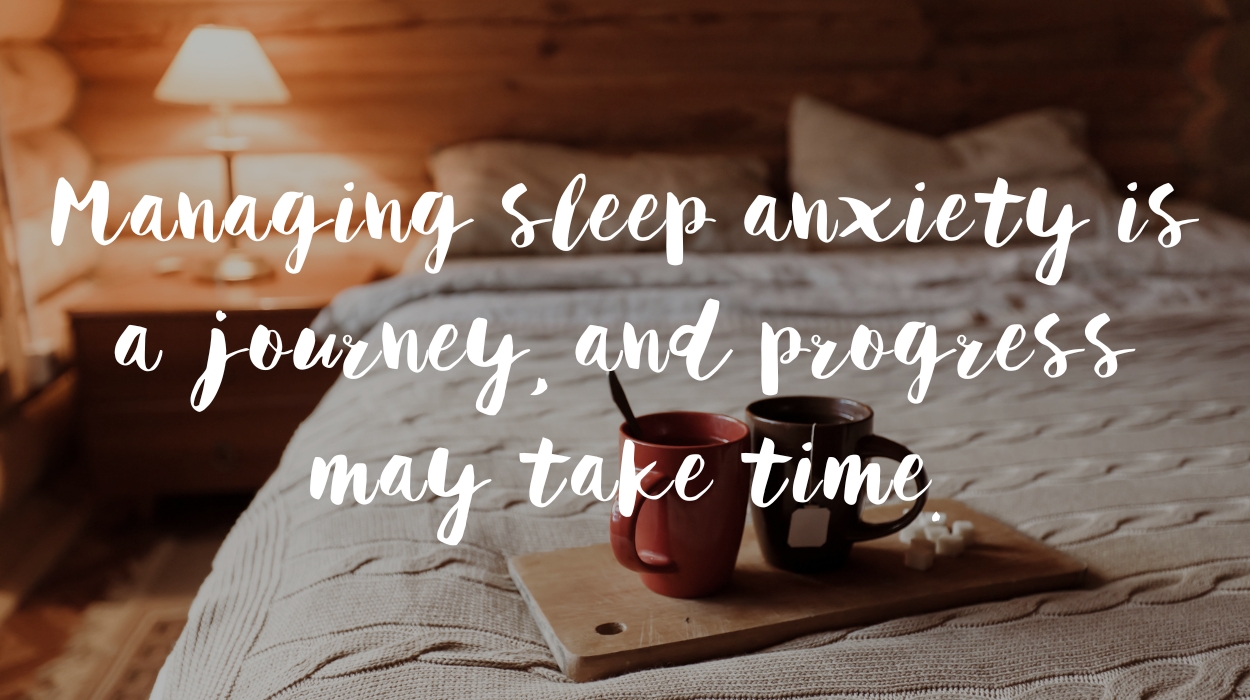Sleep anxiety, a common companion for those navigating mental health challenges like depression and anxiety, can feel like a heavy weight on the mind when night falls. It’s the restless tossing and turning, the racing thoughts, and the fear of another sleepless night, making it hard to relax and get the rest you need at night. However, managing sleep anxiety is possible with gentle strategies and understanding. Let’s explore some strategies to help you find peaceful slumber amidst the challenges.
Causes Of Sleep Anxiety
Sleep anxiety often arises from a combination of factors that affect our mental and emotional well-being. For example, stress from work deadlines, financial worries, or relationship problems can linger in our minds as we try to sleep, making it difficult to relax. Traumatic events, such as accidents or loss, may also trigger anxiety about bedtime, as our brains replay distressing memories. Additionally, lifestyle habits like excessive screen time before bed or consuming caffeinated drinks in the evening can disrupt our body’s natural sleep rhythms, contributing to sleep anxiety.
Symptoms Of Sleep Anxiety
The signs of sleep anxiety can manifest in different ways for each person, affecting both our mental and physical well-being. You might find yourself tossing and turning in bed, unable to quiet your mind. Racing thoughts, worries, intrusive thoughts, concerns about the future, or replaying past events may keep you awake long into the night. Physically, you might experience tension in your muscles, headaches, or digestive issues due to the stress of sleep anxiety. Throughout the day, you may feel fatigued, irritable, or have difficulty concentrating, despite spending hours in bed. These signs can indicate that sleep anxiety is impacting your quality of life and may require attention and support.
Practical Tips To Manage Sleep Anxiety
- Create a cozy “nest” with blankets and pillows on the floor instead of your bed, changing your sleep environment for a fresh perspective.
- Explore the practice of acupressure by applying gentle pressure to specific points on your body, such as the inner wrist or between your eyebrows, to promote relaxation.
- Practice the 4-7-8 breathing technique: inhale for a count of 4, hold your breath for a count of 7, and exhale slowly for a count of 8, repeating several times before sleep.
- Create a worry box by writing down any anxieties or concerns on slips of paper before bed and placing them in a designated box to symbolize letting go of worries until morning.
- Take a brief cold shower before bed; the shock of cold water can help lower body temperature, signaling to your brain that it’s time to sleep.
- Embrace yourself in a gentle hug or wrap up in a weighted blanket for a comforting pressure that can trigger the release of calming neurotransmitters, promoting relaxation and easing anxiety before sleep.
- Repeat a specific calming mantra like “This too shall pass” or “I am strong and resilient” and repeat it softly to yourself, allowing the words to soothe your mind and ease nighttime anxiety.
- Spritz your pillow with a calming blend of essential oils like lavender and bergamot to create a tranquil sleep environment.
- Practice the “legs up the wall” yoga pose before bed, lying on your back with your legs extended vertically against a wall to promote relaxation and improve circulation.
- Use a bedtime story app to listen to soothing bedtime stories or guided meditations designed to help you relax and drift off to sleep peacefully.
- Snuggle up with a soft stuffed animal or plush toy in bed to provide comfort and companionship, which can help reduce feelings of loneliness.
- Try the “54321” grounding technique: identify and name 5 things you see, 4 things you feel, 3 things you hear, 2 things you smell, and 1 thing you taste.
- Practice the A-Z game by thinking of fruit, drink, city, or any category you prefer starting with each letter of the alphabet to engage your mind and distract from anxious thoughts.
- Limit caffeine and alcohol intake, especially in the evening, as they can disrupt sleep patterns.
- Seek support from a therapist or counselor if sleep anxiety significantly impacts your quality of life. Cognitive-behavioral therapy (CBT) or other evidence-based therapies can help address underlying issues contributing to sleep difficulties
- Practice “worry time” after dinner, dedicating 15-20 minutes to address concerns and unwind before bedtime.
Sleep anxiety can feel overwhelming, but with the right approach and support, you can find relief and enjoy restful nights once again. Managing sleep anxiety is a journey, and progress may take time. Be patient and compassionate with yourself as you implement these strategies, and celebrate small victories along the way. By understanding the causes and signs of sleep anxiety and implementing gentle self-care practices, you can create a bedtime routine that promotes relaxation and tranquility. Remember, you’re not alone, and there is hope for a peaceful slumber ahead.
Please help us to support others and share this post, you never know who might need it.









